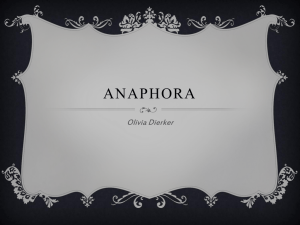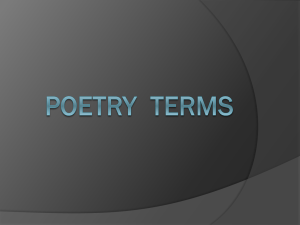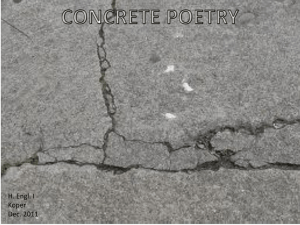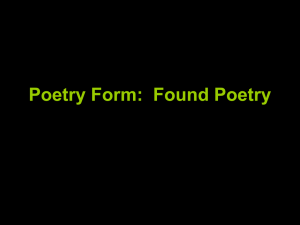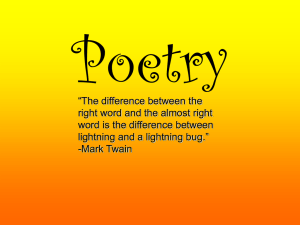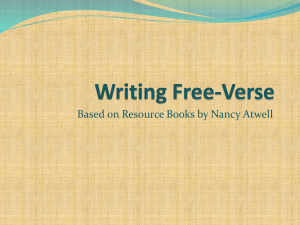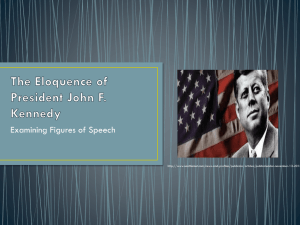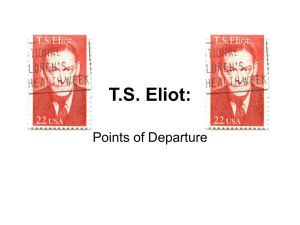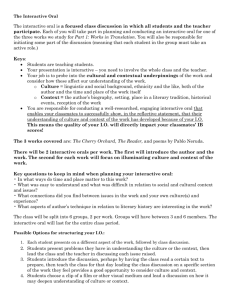9-4-12_Intro to Lit S2_6_3.2 What is Poetry
advertisement
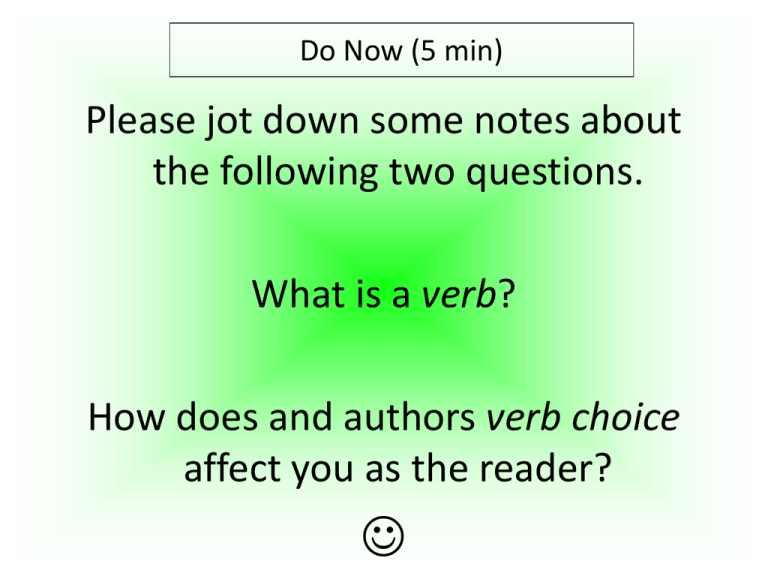
Do Now (5 min) Please jot down some notes about the following two questions. What is a verb? How does and authors verb choice affect you as the reader? What is Poetry (Part 2) Activity 3.2 (Continued) Agenda 1. Do Now (5 min) 2. Objectives (2 min) 3. Define, repetition, anaphora, and form (5 min) a) Word wall (2 min) 4. Identify examples of repetition, anaphora, and form (10 min) 5. Create a poem (10 min) a) Share out (5 min) 6. Authentic Assessment #1: More Details (5 min) 7. Authentic Assessment Work Time (10 min) 8. Closing (1 min) 9. Exit Slip (3 min) 10. Participation Grades (3 min) Objectives (2 min) Content (The knowledge you’ll master today) SWBAT: 1. Define repetition, anaphora, and form 2. Identify examples of repetition, anaphora, and form in Poetry by Pablo Neruda Language (How you will master the 3. Create a poem about poetry knowledge) By: 1. Reading and taking notes on the text 2. Reading and notating Poetry by Pablo Neruda 3. Writing a free-verse poem or using the workbook-frame Define, repetition, anaphora, and form (7 min total) Objective: SWBAT: Define, repetition, anaphora, and form by Reading and taking notes on the text -On p. 193, read the definitions and write them in the vocabulary section of your notebook (5 min) -Let’s put them on the word wall (2 min) Identify examples of repetition, anaphora, and form (10 min) Objective: SWBAT: Identify examples of repetition, anaphora, and form in Poetry by Pablo Neruda by reading and notating Poetry by Pablo Neruda -Look back to p. 191-192, and find examples of repetition, anaphora -In what form is this poem written? -how does Neruda’s verb choice affect the meaning? Create a poem (10 min) Objective: SWBAT: Create a poem about poetry by writing a free-verse poem or using the workbook-frame -Either use this (on p. 193) Or -Write your own -Make sure to think about your verb choice! Share Your Poem (5 min) Objective: SWBAT: Create a poem about poetry by writing a free-verse poem or using the workbook-frame Please share what you wrote Authentic Assessment #1: More Details (5 min) Objective: SWBAT: Understand the first embedded assessment by asking questions What questions do you have about AA#1? Authentic Assessment Work Time (10 min) Objective: SWBAT: Understand the first embedded assessment by asking questions Please use this time to start thinking about the theme that will tie together all of your poems. If you’re having trouble figuring this out, start writing and see where it takes you. If you already have this figured out, feel free to use this time to write. Closing (1 min) Did you master the following objectives? Content (The knowledge you’ll master today) SWBAT: 1. Define repetition, anaphora, and form 2. Identify examples of repetition, anaphora, and form in Poetry by Pablo Neruda Language (How you will master the 3. Create a poem about poetry knowledge) By: 1. Reading and taking notes on the text 2. Reading and notating Poetry by Pablo Neruda 3. Writing a free-verse poem or using the workbook-frame Exit Slip (3 min) 1. What word does Neruda use to create anaphora? SMART (Participation) Grade (5 min) Each day YOU will decide the grade you deserve.* Your 5-point daily participation grade is based on CLA’s core-values: CLA Students are S.M.A.R.T. S = Self-Controlled M = Motivated A = Accountable R = Respectful T = Timely What do you deserve today? *One point for each core-value (5 points possible each day). I reserve the right to change these grades.
